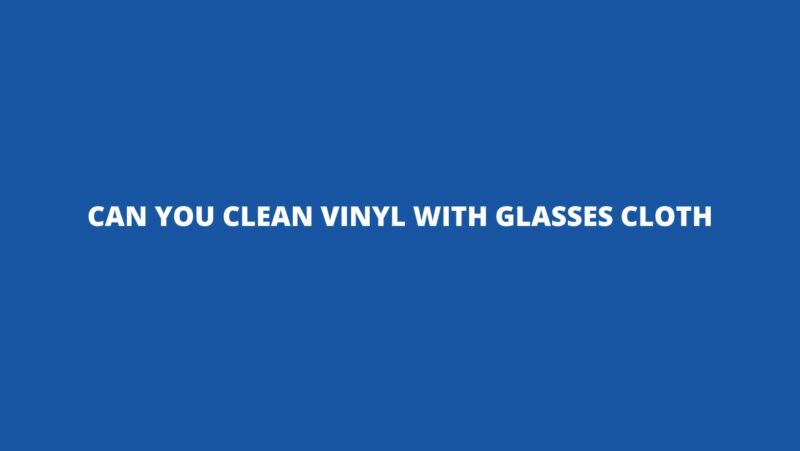Vinyl records are cherished for their unique sound and nostalgic appeal. However, maintaining the quality of these beloved artifacts requires regular cleaning to ensure an optimal listening experience. With various cleaning methods available, vinyl enthusiasts often wonder: Can you clean vinyl with a glasses cloth? This article delves into the intricacies of using a glasses cloth to clean vinyl records, examining the benefits, potential risks, proper technique, alternative cleaning options, and the importance of maintaining the integrity of these musical treasures.
Understanding the Vinyl Cleaning Process
- Importance of Clean Records: Clean records are crucial for preserving sound quality and preventing audible imperfections such as pops, crackles, and distortion. Dust, dirt, and debris on the record’s surface can affect the stylus’s tracking and lead to compromised playback.
- Methods of Cleaning: Vinyl enthusiasts use various cleaning methods, including record brushes, cleaning solutions, and specialized cleaning machines. The goal is to remove contaminants from the grooves while minimizing the risk of damage.
Glasses Cloth for Vinyl Cleaning: Benefits and Risks
- Gentle Approach: A glasses cloth is made of soft and non-abrasive material, making it a gentle option for cleaning delicate surfaces like vinyl records. It’s less likely to cause scratches compared to abrasive materials.
- Removal of Loose Particles: A glasses cloth can effectively remove loose particles, dust, and surface debris from the record’s surface. It’s a quick and convenient solution for light cleaning.
- Risks of Scratching: While glasses cloths are generally gentle, there’s still a risk of causing micro-scratches on the record’s surface. These scratches might not be immediately visible but can accumulate over time and affect sound quality.
Proper Technique for Using a Glasses Cloth
- Preparation: Ensure the glasses cloth is clean and free from any debris that could transfer to the record’s surface. Wash the cloth if necessary to remove dust and dirt.
- Dry Cleaning: To use a glasses cloth, gently wipe the record’s surface in a circular motion. Apply minimal pressure to avoid causing scratches. Use multiple passes if needed.
- Avoid Outer Grooves: Focus on cleaning the outermost grooves of the record where debris is most likely to accumulate. Avoid the center label and the inner grooves to prevent accidental damage.
Alternative Cleaning Options
- Record Brushes: Record brushes designed for vinyl cleaning offer a more effective way to remove dust and debris. They are designed to minimize the risk of scratching while effectively cleaning the grooves.
- Cleaning Solutions: Specialized record cleaning solutions, when used with a microfiber cloth, can help remove more stubborn contaminants from the grooves. These solutions are designed to evaporate without leaving residue.
- Professional Cleaning Machines: For enthusiasts seeking a thorough cleaning, professional record cleaning machines use a combination of cleaning solutions, gentle brushes, and vacuum suction to remove contaminants.
Maintaining Vinyl Treasures: Preservation Tips
- Regular Maintenance: Regularly clean vinyl records to prevent the accumulation of dust and debris that can lead to long-term damage. Light cleaning sessions can be part of your routine maintenance.
- Storage Care: Store vinyl records vertically in a cool, dry place to minimize the risk of dust settling on the surface. Use proper inner sleeves to protect the record from friction.
- Avoid Moisture: When cleaning vinyl records, ensure that the glasses cloth or cleaning material is dry. Moisture can seep into the grooves and cause damage over time.
- Mindful Handling: Handle records with clean hands and avoid touching the grooves. Always hold the record by the edges to prevent transferring oils and dirt.
Conclusion
While a glasses cloth can serve as a convenient and gentle method for light vinyl cleaning, it’s important to approach the process with care and consideration for the record’s longevity. While glasses cloths are less likely to cause scratches compared to abrasive materials, there’s still a potential risk of micro-scratches over time.
For those seeking a more comprehensive cleaning solution, record brushes, specialized cleaning solutions, and professional cleaning machines offer effective alternatives that help maintain the integrity of the vinyl’s grooves.
Ultimately, the goal of vinyl cleaning is to preserve the sound quality and longevity of these cherished musical artifacts. Whether you opt for a glasses cloth or explore other cleaning methods, the care you invest in maintaining your vinyl collection ensures that the magic of analog sound continues to captivate your senses for years to come.


